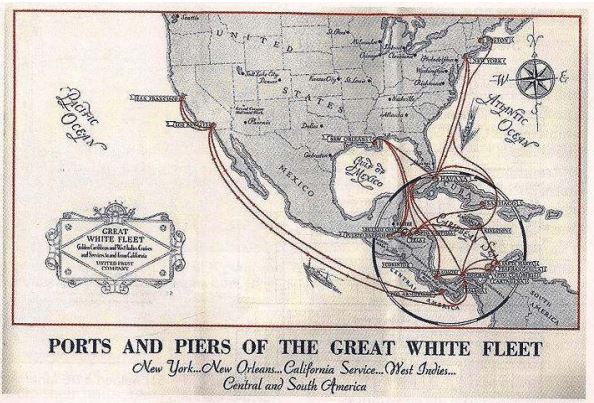
The United Fruit Company, which later became Chiquita Brands, ran a fleet of cargo/passenger ships that were known as the Great White Fleet. Puerto Armuelles was listed on several brochures as a port of call in the 1930’s.
Here are some brochures from the collection of Björn Larsson:
Each ship carried an average of 35,000 bunches of bananas.
Menu cover on the Great White Fleet vessel called “Talamanca”, from the collection of Mr. Hayden Matthews:
The ships were said to provide gourmet meals to the passengers on board!
Inside of menu:
Read about the Great White Fleet HERE.
Please follow and like us:
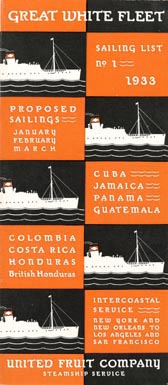
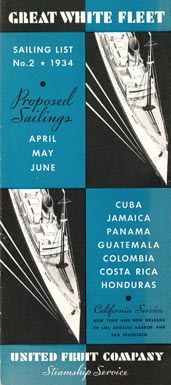
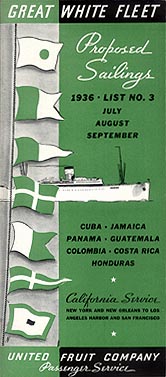

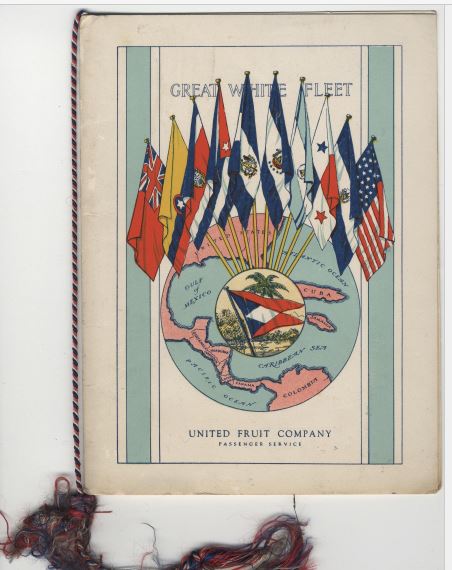
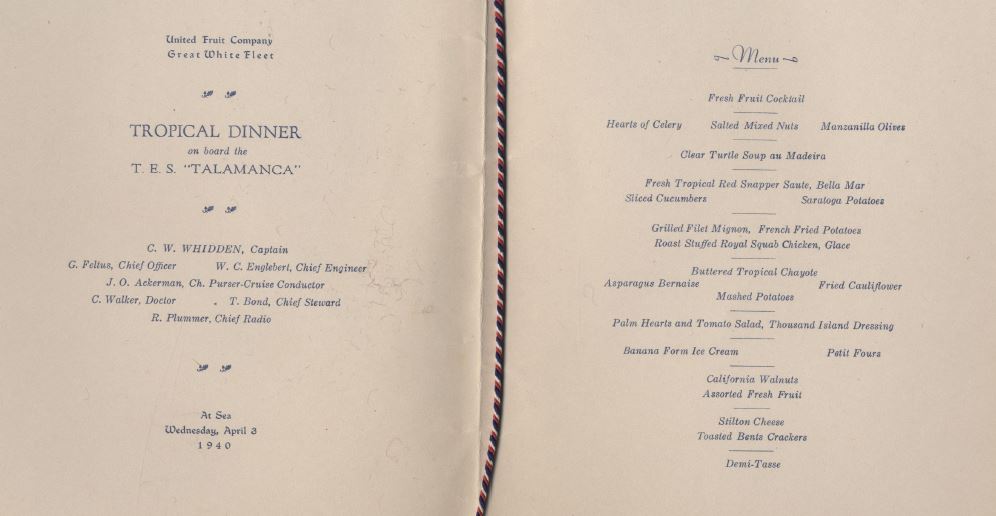


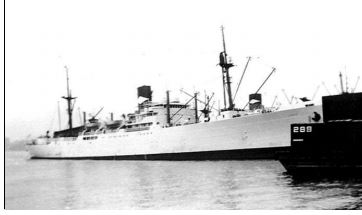
I am writing an account of my father’s experiences in US Army World Wars II. During one of his journeys he was on the “Jamaica” shortly before it was changed into a troop transport. I am wondering about permissions to use pictures of the “Jamaica,” and interior shots when it was the “Peten,” as well. In other words are there copyright issues?
I got those photos from Wikipedia Commons, so no copyright issues. Feel free to use them! was your father ever in Panama?
This is so kool i am doing research On Port Antonio and i am looking for pictures, stories any thing that as to d with Portland in its hay day
portlandja@gmail.com
What an incredible find for me as I trace my grandfather’s history. He was a steward on the Parismina (renamed the General Sherman in 1932) circa 1930. By chance I found his name on a crew list that year, so to have these brochures and the history is a gift. He worked in the produce industry all his life, so it was probably a thrill for him to cruise the gulf from Cuba to New Orleans, Can’t thank you enough!!
Wow! That is amazing Charles. A lot of info from that time period is actually available through a Google search these days. More and more info is being made digital. So Glad you enjoyed it!
I’m so glad to hear that you found our research useful! Thanks for the comment Charles.
Back in 1939 ,my family lived in the little village of OSTRICA , Louisiana which is about 65 miles south of New Orleans, on the Miss. river. We would see these beautiful banana ships going up and down the river. We often went out in small row boats to retrieve bananas which the crew would pitch over the side.
I would love to have photos of any of those ships to build a model of. the only one name I can remember is the CEFALU,
Thanks really interesting, that you rowed out to the ships and they threw bananas to you! I got most of the information in my article from Googling and there is really a lot of good info, and images, available online. I’m sure you can find an appropriate image to copy. Good luck with your model!
I traveled on the SS Veragua sometime in the 1940’s — I was a small child and don’t remember the year — I have a postcard with a picture of that ship that I will be happy to scan and send / upload — perhaps the admin can facilitate??!!
Send any photos you have to editor@visitPuertoArmuelles.com
Thank you for the consideration ~ we’d be thrilled to post them here!
That’s awesome Carole! Send them to editor@visitPuertoArmuelles.com and I’ll post them on the website.
Thanks so much!
Debbie
My father was the architect of these ships from the late 1920′ to 1965. I had a inlaid wooden picture of TSS Junior and the launching booklets for the Telde, Gedera, Tenadores,Vegesack and Tilapa. In addition, my mother christened one of the ships ( not named in this grouping) in 1959. What fun to find this posting!
What was the name of the ship your mother christened? I’ll be happy to post copies of any photos you’d like to share.
My grandfather was the hospital administrator for United Fruit Company in Almirante, Panama, Puerto Castilla, Honduras and Puerto Armuelles, Panama from 1919 to 1938. During this period, my mother and her parents and sisters sailed several times per year on the ships of the Great White Fleet. We have photo albums with pictures from that era.
That’s really amazing! It would be so wonderful if you could scan or take photos of them with a digital camera to email to us. We would be happy to share some of them on the website. There are a lot of history buffs out there, and Puerto has a vibrant history.
Hello. I find your post very exciting. My wife is researching her father’s (Gilbert A. Smith) travels to Panama in the mid 1920s. Have you posted your photos anywhere as I am sure many people would be anxious to look at them for family.
Thank you very much.
Don
Hola Don, I’m glad the site is interesting to you and your wife! The photos I’ve posted are from other people. There are a few old timers here with huge stacks of historical photos. I’ll be happy to introduce you if you ever make it to Puerto for a visit. In the meantime, I’ll continue to post more from time to time.
My mother sailed from NYC, 1 Dec 1943 to Puerto Cortez to marry my father who worked for UFC in Honduras. Looking for name of UFC ship. It was later sunk by U-boat on leaving Honduras. Can you help? Ship arrived Puerto Cortez around 12 Dec 1941.
I’ll do some research when I have time. That’s a fascinating story!
I recall hearing that the unfortunate ship was the San Jose (and I believe there was a later Junior-class ship with the same name). My dad, Vincent A. ‘Sarge’ Labate, Jr, during that time, was stationed with the Army Air Corps in Guatemala City. He was an aircraft mechanic, and he flew with a colonel who was an air attache providing assistance to the various Central American air forces (and airlines). During a trip to Tela, Honduras he met a lovely young lady from Scotland whose family had moved to Tela. This lady, Jean Crichton, later became his wife, and a year later my mother. Oh yes, the ship…as my dad recounted it, he was in Tela when one of the Honduran air force pilots asked him for assistance to arm his biplane with bombs–he was going to go after that German sub. Together, they wired a couple of 50-pound bombs under the wings with a jury-rigged release system, and took off on their mission. The search seemed to prove fruitless, and Dad had to get insistent with the pilot that they had exhausted more than half of their fuel, and if they didn’t want to swim back to Tela the had better turn around. Just then they spotted a submarine just beneath the surface and dropped the little bombs, hoping for a bit of luck. They were able to make it back to the airport, and later they started hearing reports of oil washing up on the pristine Tela beach. Was it because of damage to the sub, or did the sub release oil to fool them? I’ve never heard the outcome. But years later my aunt Nan (Nan Dahlgard, my mother’s closest sister who lived in Tela) told the same story about the locals grousing about Dad bombing a sub and ruining the beach. Dad went on to join the Fruit Company in Tela, then Los Andes, Guatemala, then Parrita, Costa Rica, and finally Puerto Armuelles from 1953-61, where he worked in the Taller Mecánica. It was a great place to grow up!
I”m glad I came across this site.
My grandfather Harry Spencer, was Captain of the Calamares, Peten/Jamaica Santa Marta and others over a career of around 30 years.
I am always looking for information, as he saved very little.
Will Willis
Thanks! I am having a great time researching and discovering more of the colorful past of Puerto Armuelles.
Looking for photos of the interior of the post war SS Jamaica…
I have a gouache painting of a mural intended for that ship in 1946-47 and I am curious if these murals actually appeared there. The artist was Lou Block, living in NYC, while the refit was being done on Staten Island.
My parents, brother and I sailed from NY on the S.S. Jamaica May 5, 1950 stopping in Havana, Cuba (I have photos of my brother and I at the Havana Zoo) then on to PTO, Barrios Rep Guatemala. My father was the flight instructor for the Salvadoran AF for about 2 years. We do have a few photos from on board ship. I also have a copy of the ship manifest.
I’d love to have you send copies of your old photos & to publish them on the website, if that is okay with you. Please send to Debbie@visitPuertoArmuelles.com
Hello,
I have looked for digital commons picture the SS Coppername, which was one of the United Fruit ships that sailed from New Orleans in the 1920s. I am writing a family history and my father was a missionary to Guatemala and I learned that he sailed on that ship in 1924 to go to Guatemala via Belize. Like your other reader (Charles), I would like to see if I can use an image from you post, if it is indeed free. Many thanks.
Grace
I have no problem with you using photos from my website for personal use. I’d love to post any others that you may be willing to share too. Or, any stories of Puerto from the past. Editor@visitPuertoArmuelles.com
Circa 1962, I was a student studying for my second college degree at Fairleigh Dickinson University. At the summer break I sailed on SS CIBAO as a Refrigeration Engineer. We departed New Jersey and traveled down to Honduras and loaded bananas. We then left to unload in New York. However a Longshoreman strike shut down the entire New York port and we changed course and unloaded in Gutenberg, Sweden. This was vary fortunate for me as it gave me the opportunity to fly to Oslo Norway to visit an old girlfriend and then return to the ship before it left to return to New Hersey. She was a good ship.